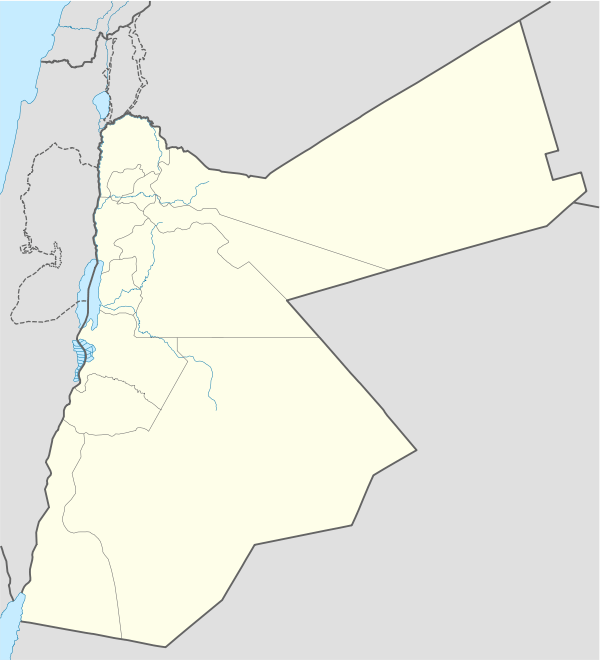Fuheis
Fuheis (Arabic: الفحيص) is a town in the central Jordanian governorate of Balqa, just 20 kilometers northwest[2] of Amman. The town has 20,000 residents and lies approximately 850 meters above sea level.
Fuheis, Jordan الفحيص Fuhais | |
|---|---|
Town | |
 Fuheis, Jordan Location in Jordan | |
| Coordinates: 32°01′N 35°46′E | |
| Country | |
| Governorate | Balqa Governorate |
| Municipality established | 1962 |
| Government | |
| • Type | Municipality |
| • Mayor | Jamal Hattar |
| Area | |
| • Metro | 7 sq mi (17 km2) |
| Population (2015)[1] | |
| • Town | 18,916 |
| • Religions | 60% Greek Orthodox, 35% Catholics, 5% other mainly Sunni Muslims. |
| Time zone | GMT +2 |
| • Summer (DST) | +3 |
| Area code(s) | +(962)6 |
| Website | http://www.fuheis.gov.jo |
It lies in Wadi Shueib (Valley of Jethro), between Salt and Amman.
The population of Fuheis was approximately 18,916 in 2015, with a male-to-female ratio of 52:48.
Jordanian citizens make up 87% of the population. According to the national census of 2004, the population was 14,641. The census of that year shows that there were 3,309 households in the city with an average of 4.5 persons per household, lower than the national average of 5.3 persons per household. The majority of Fuheis' population are Christians.
The population of Fuheis increases to about 20,000 in the summer, as many of city residents who have emigrated to the United States and Europe return for their summer vacations. The city's elevation renders it cool enough to spend the summer comfortably.[3]
Fuheis is also famous for its traditional habits from singing and dancing (dabke), and for depending on its farms.[4]
Economy and Development
Fuheis' economy has historically centered around agriculture. Most of Fuheis' population works in agriculture, trade, cement industry and civil or office jobs. The olive industry is important to Fuheis' economy, along with orchards and vineyards. The cement factory - Jordan's largest - is by far the largest industry in Fuheis, employing about 70% of the town's population. Among its most important villages are al-Rahwa, Ras al-Jundi, and al-Suqariah, known for their farms and trees.[5]
In 2010, German researchers from the Helmholtz Centre for Environmental Research implemented a demonstration facility for decentralised wastewater technology in Fuheis. The project was handed over to the management of Al-Balqa` Applied University.[6]
Religion
Approximately 60% of the population belong to Greek Orthodox Church of Antioch, 35% are Catholics. Members of the Latin Patriarchate of Jerusalem and Sunni Muslims make up the rest of the population. The Latin Parish of Fuheis established a secondary school during the Ottoman Period in 1885. Taught by priests, students of this school learned Arabic, Religion and Math. The school has since expanded, remaining open until today.[7]
Heritage and Archaeology
Archaeological excavations in Fuheis uncovered a circular building from white limestone which dates back to the Iron Age and the Byzantine age. This building was repurposed as a church in the Ayyubid and Mamluk periods, and within the building is a blueprint of the church in addition to a number of graves that were built in the church's land. The excavations suggest that the area's water sources may have drawn many to the region or that the settlement had a military purpose. The ruins are surrounded by small dug wells and enclosed water closets which were connected by a spout carved from rock. In the same area, excavators found a carving on basalt rock in Greek letters and crosses carved into limestone.[8]
Culture
al-Ruwaq
Fuheis' al-Ruwaq district boasts hundred-year old stone cottages, preserved by a Jordanian who bought an art gallery in the area and proceeded to buy several cottages in the area, converting them to art-and-craft shops.[9]
Fuheis Festival
Fuheis festival is an annually held event in Fuheis, and it is considered to be the second biggest festival in Jordan, after Jerash Festival.
They have celebrated their silver jubilee in 2016, where they have welcomed bands and artists from Jordan, Syria, Palestine and Lebanon to perform in concerts and poetry evenings.
Several artists and singers from across the region were invited to perform in the town, like: Wadih El Safi, Melhem Barakat, Sabah Fakhri, Fares Karam, Moeen Charif, Omar Al-Abdallat, George Kurdahi, Najwa Karam, and many more, and the variety of night events and activities attracts around 10,000 to 30,000 visitors yearly.
List of Mayors of Fuhais
| Rank | Mayor | term |
|---|---|---|
| 1 | Fahad Sweiss | 1963-1964 |
| 2 | Essa Smairat | 1965-1967 |
| 3 | Fareed Akroush | 1968-1971 |
| 4 | Yousuf Daoud | 1972-1980 |
| 5 | Adoluf Sweiss | 1980-1984 |
| 6 | Kamal Daoud | 1985-1987 |
| 7 | Farouq Jraisat | 1988-1992 |
| 8 | Jamal Hattar | 1992-1994 |
| 9 | Anton Dayyat | 1995-1999 |
| 10 | Hweishel Akroush | 1999-2003 |
| 11 | Fuad Smairat | 2003-2007 |
| 12 | Jeries Sweiss | 2007-2010 |
| 13 | Hweishel Akroush | 2013-2017 |
| 14 | Jamal Hattar | 2017- |
See also
- Greek Orthodox Church of Antioch
- Jordanian Christians
References
- "The General Census - 2015" (PDF). Department of Population Statistics.
- Matthew Teller. The Rough Guide to Jordan. Rough Guides 2007. ISBN 1-84353-458-4.
- البزم, نضال. اطلس مدن الأردن. دارالأسرة للإعلام و دار عالم الثقافة للنشر.
- "Fuheis municipality". Archived from the original on 2011-07-22. Retrieved 2009-11-21.
- البزم, نضال. اطلس مدن الأردن. دارالأسرة للإعلام و دار عالم الثقافة للنشر.
- "First German-Jordanian research and demonstration facility for decentralised wastewater technology opens in Jordan". Helmholtz Centre for Environmental Research. Helmholtz Centre for Environmental Research.
- "Immaculate Heart of Mary Parish - Fuheis". Latin Patriarchate of Jerusalem.
- البزم, نضال. اطلس مدن الأردن. دارالأسرة للإعلام و دار عالم الثقافة للنشر.
- Teller, Matthew. Jordan. Rough Guides. p. 141.